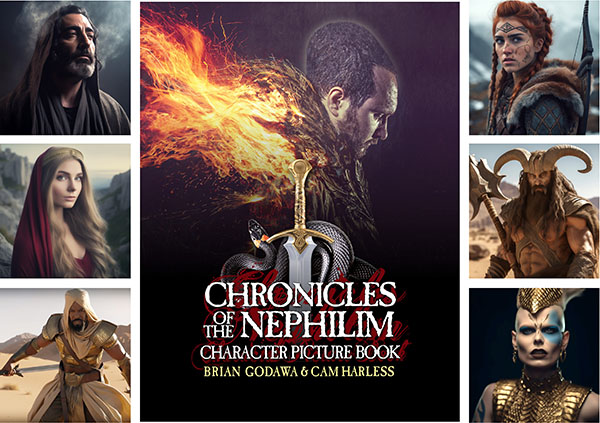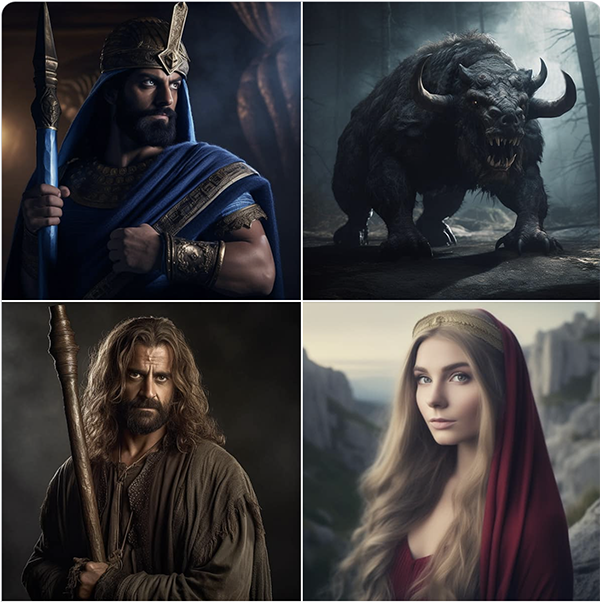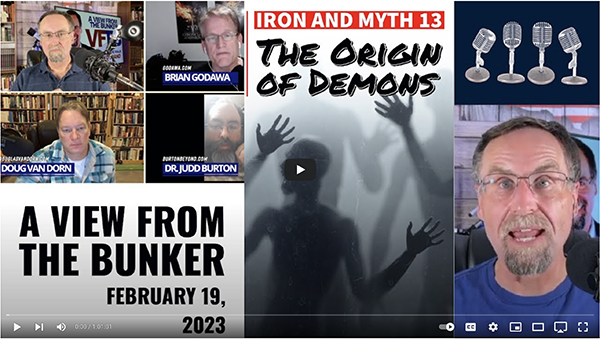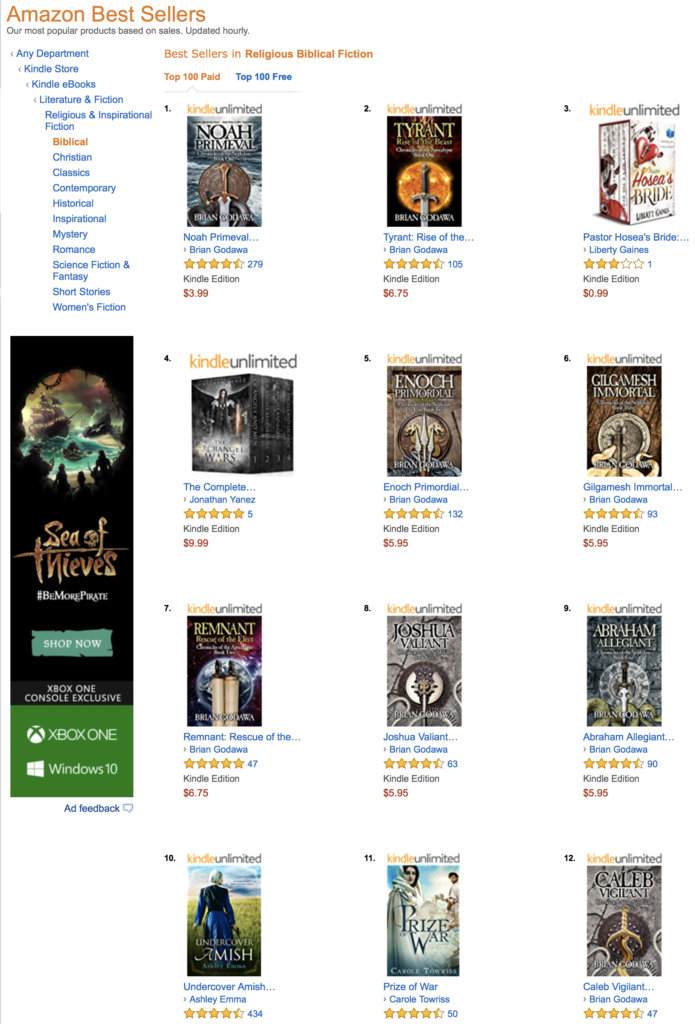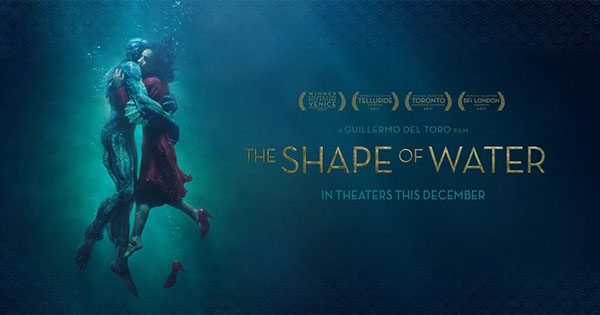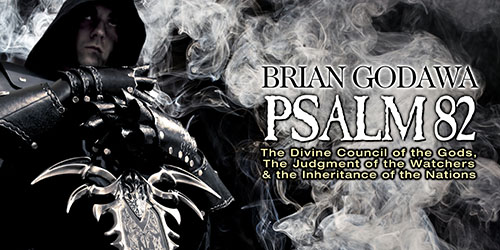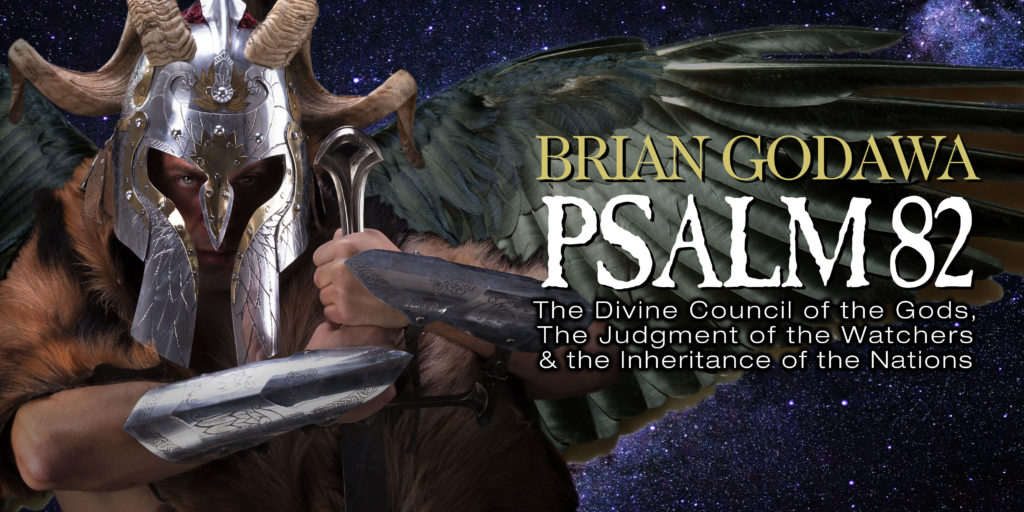Okay, here is the full article I wrote analyzing the Noah script. More here than where it was published online.
By Brian Godawa
As a screenwriter of films like To End All Wars and Alleged which deal with faith, and as the author of a novel called Noah Primeval about what led up to the Great Flood, I am especially conscious of issues relating to the intersection of Hollywood and the Bible and I’ve been keeping tabs on a film that lives at that intersection, a film called Noah, written by Darren Aronofsky and Ari Handel. I’ve also watched with great anticipation as a post-Passion of The Christ Hollywood tries to come to grips with how to reach the massive faith-friendly audience and I’m concerned about the phenomenon that I see, which is films being developed for that audience by people who don’t understand it and are thus destined to fail. Then when they do fail, as expected, smug Hollywood executives declare “See, that audience doesn’t really exist.” I don’t want that to keep happening. I want films to be properly developed so that they can succeed. It is in that spirit that I offer my analysis of Aronofsky and Handel’s Noah script. I believe that it’s never too late to right a ship that is heading in the wrong direction.
Having got a chance to read an undated version of the script for Noah I want to warn you. If you were expecting a Biblically faithful retelling of the story of the greatest mariner in history and a tale of redemption and obedience to God you’ll be sorely disappointed. Noah paints the primeval world of Genesis 6 as scorched arid desert, dry cracked earth, and a gray gloomy sky that gives no rain – and all this, caused by man’s “disrespect” for the environment. In short, an anachronistic doomsday scenario of ancient global warming. How Neolithic man was able to cause such anthropogenic catastrophic climate change without the “evil” carbon emissions of modern industrial revolution is not explained. Nevertheless, humanity wanders the land in nomadic warrior tribes killing animals for food or wasteful trophies.
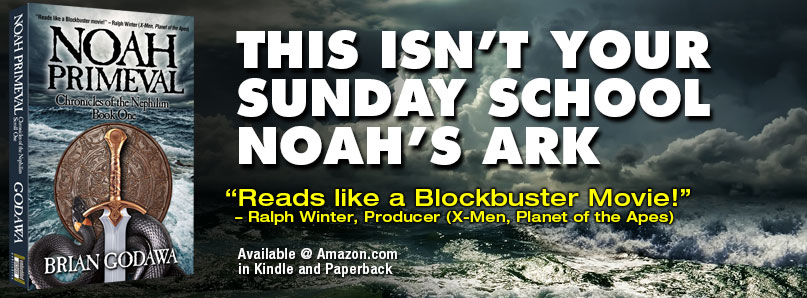
In this oppressive world, Noah and his family seek to avoid the crowds and live off the land. Noah is a kind of rural shaman, and vegan hippy-like gatherer of herbs. Noah explains that his family “studies the world,” “healing it as best we can,” like a kind of environmentalist scientist. But he also mysteriously has the fighting skills of an ancient Near Eastern Ninja (Hey, it’s a movie, give it a break).
Noah maintains an animal hospital to take care of wounded animals or those who survive the evil “poachers,” of the land. Just whose animal rights laws they are violating, I am not sure, since there are only fiefdoms of warlords and tribes. Be that as it may, Noah is the Mother Teresa of animals.
Though God has not spoken to men or angels for a long time, Noah is haunted by recurring dreams of a rainstorm and flood that he surmises is God’s judgment on man because as Noah says, “At our hand, all he created is dying.” The trees, the animals, and the environment. “If we change, if we work to save it, perhaps he will too [save us].” Or as grandfather Methuselah reiterates, “We have destroyed this world, so we ourselves will be destroyed. Justice.” Oh, and I almost forgot, they kill people too, but it’s not really as important. In another place, “We have murdered each other. We raped the world. The Creator has judged us.” The notion of human evil is more of an afterthought or symptom of the bigger environmental concern of the great tree hugger in the sky.
Noah seeks advice from his grandfather, Methuselah, the oldest man alive, who lives in a cave. Unfortunately for fighting pacifist Noah, he has to go through the Watcher’s Land to get there. The Watchers are angels who came down from heaven to help fallen humanity by granting them wonders of knowledge from magic to science to stars, metal, and fire. But when mankind turned that knowledge into weapons of war and tools of environmental devastation, God banished the Watchers to earth and turned his back on them. Now, they reside as 18-feet tall, six-armed grumpy angelic complainers who resent mankind.
Through tricky movie dialogue, Noah convinces the Watchers to help him and he receives a magic seed from Methuselah that blooms a magical forest in the desert. It’s really a quite imaginative and powerful scene that shows God’s miraculous provision. Noah uses this timber to build his boat (Wait a second. Wouldn’t that make him an evil clear cutting lumberjack?). So the Watchers help him build the craft. Followed by another beautiful sequence of a magical thread of water that spreads out from the forest into all the world that calls the animals two by two to come to the ark.
Like a magical Mesopotamian Dr. Doolittle, Noah has the ability to “lead” the animals peacefully into the ark as they come from every corner of the earth. And yes, even the insects. Well, they finish building the ark, the rains start, the evil mobs try to get on the ark, but the Watchers fight them off, blah, blah, blah, movie action and we are at the midpoint of the movie, with Noah and his family on the ark, weathering out the flood.
What Noah doesn’t know is that evil warlord Akkad snuck his way into the boat and plans to kill all the men and rape all the wives to start civilization as his own brood of evil minions.
Meanwhile, Noah has himself become a bit psychotic, like an environmentalist or animal rights activist who concludes that people do not deserve to survive because of what they’ve done to the environment and to animals. Noah deduces that God’s only reason for his family on the boat is to shepherd the animals to safety, “and then mankind disappears. It would be a better world.” He concludes that there will be no more births in this family so that when they start over in the new world, they will eventually die out, leaving the animals in a humanless paradise of ecoharmony and peace. As Noah says, “The creatures of the earth, the world itself, shall be safe.” (Except for slamming intergalactic meteors, non-anthropocentric global warming, ice ages, sun spots, volcanoes, earthquakes, tsunamis, hurricanes, and that “survival of the fittest,” eat-or-be-eaten thing. But other than that… “safe.”)
His ethical reasoning? The same as all environmentalist activists: The ends justify the means. “We must weigh those [human] lives against all creation.” Shades of Malthus and Al Gore.
There’s only one problem. One of the women on the ark is pregnant, and Noah decides that if it is a boy, it can live, but if it is a girl, he must kill it. We can’t have more of those nasty little virus-like humans swarming the earth. So most of the last half of the script is a family killer thriller like Sleeping With the Enemy, that asks the dark dramatic movie question “will Noah kill the child if it is a girl or not?” Ancient sex-selection infanticide.
The woman gives birth to twin girls, and Noah gets all the way up to killing not one but two female infants, after killing evil meat-eating Akkad. But in the end, he fails. He says “to himself, to the Creator,” “I can’t. I can’t do it. I am sorry. I am so sorry.” He is just too compassionate to carry out God’s cruel plan. Noah is more loving than God.
The denouement shows a miserable drunken Noah with his growing family of future earth-killing grandchildren being told by his daughter-in-law to teach them “about the world around them and how to live in it.” Because, “Maybe if you give them your wisdom they will do better with their world than we did with ours.”
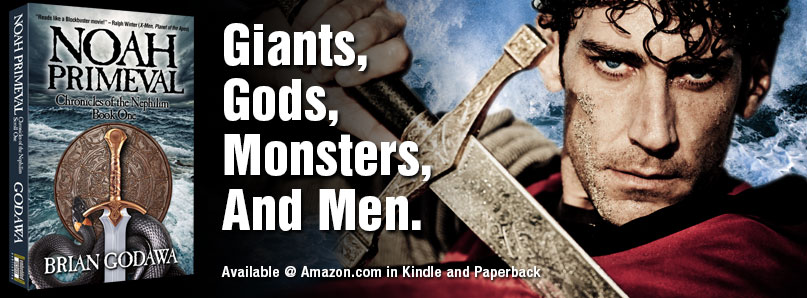
CREATIVE LICENSE
It is no secret that Aronofsky set out to make a political propaganda piece for environmentalism. He said so himself to entertainment reporters:
“It’s about environmental apocalypse which is the biggest theme, for me, right now for what’s going on on this planet. So I think it’s got these big, big themes that connect with us. Noah was the first environmentalist.” (see here: SlashFilm.com)
Before analyzing the message of this story, we need to get a few things straight. First off, there is nothing wrong with retelling stories of the past to highlight an issue in the present. In fact, pretty much all period pieces do this. The King’s Speech was about more than courage to do public speaking, it was about standing up to global terrorism. The Crucible was about more than the Salem Witch Trials, it was a metaphor for McCarthyism. Heck, even the Bible does it. It’s the way we writers write. We interpret the present through the past and the past through the present. But is our analogy or metaphor legitimate and germane to the original meaning? Or is it a distortion akin to making someone say the opposite of what they actually said?
Secondly, there is nothing wrong with engaging in creative license, whether it is magical seeds or six-armed Watchers, or even Noah as a warrior. I don’t even think there is a problem in using non-biblical sources like the Book of Enoch or the Sumerian version of the Flood story, where unlike in the Bible, Noah receives dreams about the coming Deluge. The question is, does it support the spirit or meaning of the original story, or the original author’s intent. Bible believing Christians do not necessarily own this category of Biblical interpretation. The Bible doesn’t say what vocation Noah had before the Flood, only what he was afterward (a tiller of the soil). So if a Christian attacks the notion of Noah as a warrior shaman, he may really be illustrating his own cultural prejudice of the notion of a white bearded old farmer which is not in the Bible either. Saying “That didn’t happen on the ark,” is sheer ignorance because nobody knows what happened on the ark, because it wasn’t written down! Hyper-literalists are too often ignorant of their own unbiblical notions.
On the other hand, postmodernists fancy playing God and changing the meaning of texts to suit their agenda because they believe language creates reality. Therefore, it’s okay to “make the Bible say what we want it to say.” This is manipulative narcissistic nonsense, but that doesn’t change the fact that understanding the original intent is not always easy. All authors unavoidably bring some of their own meaning to the text. The real question is: Does the creative license or embellishment serve the meaning or theme intended in the original story or does it twist it into an alien meaning against the original story, a favorite propaganda tactic of postmoderns, leftists, and radicals.
Was Noah the first environmentalist and animal rights activist? Was the moral failure of man in Genesis, disrespect for the environment? Was that why God completely destroyed the environment and killed all of the animals of the land except those on the ark?
Of course not.
THE THEME
First, let me say that no Christian that I am aware of believes that we should carelessly pollute the environment and kill animals without concern for the consequences of our actions. Those kind of accusations are straw man caricatures from ignorant anti-Christian bigotry. The Bible itself is where we get the notion of being responsible stewards of the earth. Genesis 2:15 says that God put man in the Garden “to work it and keep it.” The basic meaning of the Hebrew text is to exercise great care while cultivating it. If anything, Adam was the first conservationist, not environmentalist, because he was to work the land, use human planning to overcome the thorns and thistles of nature. Which brings us to the next command that God also gives to mankind relating to the environment.
And God said to them, “Be fruitful and multiply and fill the earth and subdue it, and have dominion over the fish of the sea and over the birds of the heavens and over every living thing that moves on the earth.” (Genesis 1:28)
The Hebrew words for subduing the earth and having dominion are military terms of conquest. So, we see that man is to use his technological insights to forcefully harness the wild and chaotic forces of animals and the environment to bring them into good use. This is not a command to pollute or pillage the earth, but neither is it a subordination of man as a servant of the earth. The earth was made for man, not man for the earth, unlike pagan earth religion or environmental extremism, which claims that man is made for the earth, not the earth for man.
Because the Bible was the first in history to divest nature from deity, it argued that nature is NOT a personal being or filled with animistic spirits or a part of deity. This was the foundation of technological progress that brought about a better world of extended life spans, modern science and medicine, travel, better food production, and much more. If nature is impersonal, then we are justified in harnessing it for human good. But that is not a call to exploitation as previous verses explained. The Law of God even had rules for treating beasts of burden humanely (Ex 20:10; Deut 25:4; Prov 12:10) But they were still beasts of burden for human use. Because humanity is in the image of God, animals are not.
Having defended responsible conservation of the environment, nevertheless, I have to say that the movie script for Noah is deeply anti-Biblical in it’s moral vision. While the Bible commands mankind to “work and keep” the garden of earth as its stewards, the sin that brought about the judgment of the Flood was NOT violence against the environment as depicted in the script, it was violence against God and his image in man. That’s no minor difference.
The thread of evil that leads from the Garden to the Waters began with Cain’s murder of Abel, which was considered the ultimate violence against the image of God that mankind was created in (Gen 1:27). This was because God accepted Abel’s sacrifice but not Cain’s. So the violence was based on sacred relationship with God himself. It wasn’t the ground that cried out to God, it was Abel’s blood that cried out to God for justice. Lamech then follows this pattern in killing a young man and boasting about it (Gen 4:23-24). The lineage of Cain eventually dies out and God replaces Abel’s lineage with a new Seth, son of Adam, “in his likeness, after his image” (Gen 5:3).
In Genesis 6 we read about mankind multiplying on the face of the earth. The Sons of God, angelic beings from God’s heavenly host, mate with the daughters of men to give birth to giants. Okay, this is very weird and wild to contemplate, and I don’t have time to explain it in detail here. You’ll have to read my book Noah Primeval to find out more. But suffice it to say that the main meaning here is that the heavenly beings violated a holy separation of mankind from divinity (Jude 6-7; 2Pet 2:4-10). This mixing of “images” reflects man’s perennial pursuit of trying to attain godlike status. Remember the Original Sin in the Garden? “You will be like God!” said the Serpent (who was strangely absent from the Garden of Eden in the Noah script). Man is seeking to become like God by his power over life and by his constant pursuit of divine prerogative or power. This will continue through to the Tower of Babel incident as well, when mankind tries to build a temple tower that connects heaven and earth.
The Bible then says that Noah, however was righteous, and he was “pure in his generation” (Gen 6:9). The implication here is that Noah is not merely walking with God as an obedient follower, but that he is not part of that corrupted miscegenation of angelic and human cohabitation and hybridization. Again, the image of God undefiled.
By the time God says that the wickedness of man is so great on the earth (6:5), and that the “earth was corrupt in God’s sight and the earth was filled with violence” (6:11) there is absolutely nothing that has been said about man treating the environment with violence. It is completely about violence against the image of God and rebellion against God himself, not the environment. As Near Eastern scholar Tikva Frymer-Kensky explains, the concept of the earth being “corrupted” or “polluted” was a theological expression of how man’s sin against God’s image makes man’s very physical inhabitation religiously “unclean.” The earth had a physical impurity akin to the profane abominations that defiled the land of Canaan:
In the biblical worldview, the murders before the flood contaminated the land and created a state of physical pollution which had to be eradicated by physical means (the flood). Although this concept may seem strange to us, it is not surprising to find it here in the cosmology of Israel, for Israel clearly believed that moral wrongdoings defile physically. This is explicitly stated with three sins — murder, idolatry, and sexual abominations. (Tikva Frymer-Kensky, “The Atrahasis Epic And Its Significance For Our Understanding Of Genesis 1-9,” Biblical Archaeologist, December 1977, 147-155.)
And after the flood, the image of God is again offered as God’s basis for establishing capital punishment as his primary concern in justice, not the environment (Gen 9:6). Shedding man’s blood in murder would now require just recompense of capital punishment. In the primeval history of Genesis what God cares about keeping sacred and invaluable is his image in man. And the murder and violation of that image of God is what pollutes the earth, not the other way around. As Frymer-Kensky concludes, The author(s) of Genesis wrote about the Flood “to illuminate fundamental Israelite ideas, i.e., the biblical ideals that law and the ‘sanctity of human life’ are the prerequisites of human existence upon the earth.”
In the script Noah, what God cares about is the environment, not so much man. As Noah reveals, “The world squirms beneath our foot, a poisoned husk. The Creator sees this, He mourns it, and will tolerate it no longer. He would annihilate all in an instant than watch this creeping rot… We must treat the world with mercy so that the Creator will show us mercy.”
Turning the tale of Noah into an environmentalist screed and animal rights diatribe does violence to the Biblical meaning and turns it into something entirely alien to the original meaning of the text. Admittedly, the script does include murder and violence against man as an additional “evil,” but this is secondary in the story. The primary sin of the script Noah is man’s violence against the environment. Which is kind of contradictory, don’t you think? Claiming that God destroys the entire environment because man was — well, destroying the environment?
And how in the world was Neolithic man able to destroy his environment and cause global warming anyway? Exactly where did the carbon emissions come from? Fred Flintstone SUVs? Industrial campfire smokestacks? The number of people on the planet in that distant age would have less impact on the climate than bison farts. It’s really quite ludicrous, but inadvertently hints at the historical and scientific fact that far greater global warming and cooling cycles have occurred in the past without man. It’s quite natural. Consider it the Circle of Life.
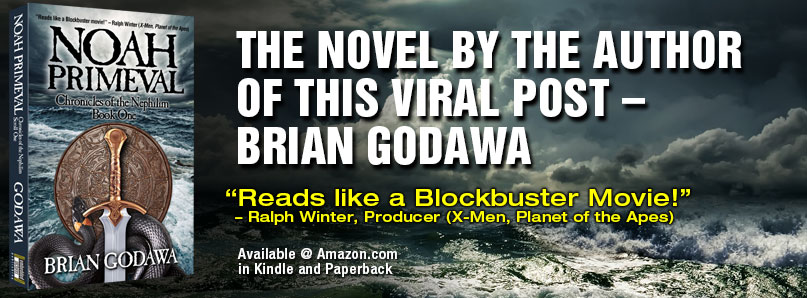
PSYCHO NOAH
Perhaps one of the most disturbing aspects of the Aronofsky/Handel script is its portrayal of God in the moral worldview of Noah. I’m not talking about the fact that Noah is sinful in the movie or that he gets drunk. That is in the Bible. That’s not the problem. The problem is that Noah is depicted as attempting to follow God’s will in the script, a will that includes the complete annihilation of the human race, as opposed to the Genesis depiction of starting over with eight humans to repopulate and ultimately provide a Messiah.
Someone could well make the argument that Noah’s journey is one of realizing that his zeal for his environmental and animal rights cause has gone too far, and that he finally realizes that killing people is too extreme. There must be a balance of interests. In one scene, Japheth accidentally kills a lizard that will now die out because it was only one of two. Noah explodes in rage upon his son for his carelessness. Then he repents and realizes that “the same wickedness is in all of us.”
But I am skeptical of this “balance of interests” interpretation of the script. Noah does not have a revelation that he has made animals more important than humans, rather he has “realized” that the evil against animals is in all of them, such as his son. Then the very next thing he concludes is that there will be no wives on the ark and they are not going to repopulate humanity after the Flood. He says, “As long as there are men, creation is not safe.” Add to this, the fact that the animals aboard the ark help Noah to pin down his family so he can kill the infant girls. That clearly supports the notion of God being behind it all.
Also, at the end, when psycho Noah realizes that he cannot kill the baby girl to stop the human race, the reason is not because he realized he was too extreme against humans, but because he was too weak to follow through with God’s commands and his “higher cause” of genocide. This Humanistic worldview certainly tugs at the heartstrings of our hubris. Man’s weakness of compassion makes him superior to God.
Killing all humans but eight in order to start over (As the Bible portrays) may seem harsh to our thoroughly Modern Millie minds, but it reaffirms that Image of God in Man that gives man value despite the evil. God always saves a remnant of the righteous in order to bring about his Messianic plan of redemption. In Noah, man has no higher value than the animals and the environment. Noah wants to get rid of us all and return the environment to its pristine condition untouched by the presence of man. What is so disturbing is that this motivation to violence is exactly the worldview of many extremist leaders of environmentalism. Here are some documented samples of their human hate speech and dog whistles to violence:
“Christianity is our foe. If animal rights is to succeed we must destroy the Judeo Christian religious tradition.”
(Australian philosopher Peter Singer, the “Father of Animal Rights.”)
“If you’ll give the idea a chance… you might agree that the extinction of Homo Sapiens would mean survival for millions if not billions of other Earth-dwelling species.”
(The Voluntary Extinction Movement, quoted by Daniel Seligman in “Down With People,” in Fortune magazine, September 23, 1991)
“The extinction of the human species may not only be inevitable, but a good thing…”
(Editorial in The Economist, December 28, 1988)
“Man is no more important than any other species… It may well take our extinction to set things straight.”
(David Foreman, Earth First! spokesman, quoted by M. John Fayhee in Backpacker magazine, September 1988, pg. 22)
“We are not interested in the utility of a particular species, or free-flowing river, or ecosystem to mankind. They have… more value – to me – than another human body, or a billion of them… Until such time as Homo Sapiens should decide to rejoin nature, some of us can only hope for the right virus to come along.”
(David M. Graber, National Park Service biologist, in a review of Bill McKibben’s The End of Nature, in the Los Angeles Times Book Review, October 22, 1989, pg. 9)
“I got the impression that instead of going out to shoot birds, I should go out and shoot the kids who shoot birds.”
(Paul Watson, a founder of Greenpeace, quoted in Access to Energy Vol.17 No.4, December 1989)
“We, in the Green movement, aspire to a cultural model in which the killing of a forest will be considered more contemptible and more criminal than the sale of 6-year old children to Asian brothels.”
(Carl Amery of the Green Party, quoted in Mensch & Energie, April 1983)
This violent hatred of humanity that is displayed in the movie script of Noah also seems to emanate from significant quarters of the environmentalist movement. But ironically, it is logically inevitable that if you deny the image of God in Man, and you elevate the environment over humanity, then you will inevitably wish to eliminate humanity for a better environment.
THE WATCHERS
Another significant deviation from Biblical truth in the Noah script is the identity of the Watchers. In the script, they are portrayed as misunderstood rebels who, like Noah, also are more compassionate than God. It seems everyone in this story is more compassionate than God.
As previously indicated, the Watchers of Biblical fame are Sons of God, or angelic beings who violated God’s separation of the heavenly and the earthly, and mated with human women (Gen 6:1-4; Num 13:32-33; Dan 4:13). The New Testament quotes from and paraphrases a non-canonical Jewish text called 1 Enoch that has retained a tradition of respect within Christian history (Jude; 2Pet 2:4-10). Though it is not considered Scripture, its picture of the fallen angels cohabiting with humans affirms the Biblical notion of these being rebel sorcerers, not well intentioned educators who get blamed for mankind’s misuse of good gifts.
Aronofsky apparently uses some of his notions of the Watchers from the book of 1 Enoch, such as the names of the angel Samyaza (1Enoch 6:3) and their act of revealing secrets to mankind as well as the idea that they helped Noah build the ark (67:2). But the script’s view is the opposite of the Biblical/Enochian view of the Watchers as rebels who reveal occultic forbidden secrets that are part of the reason why God sends the Flood.
There is one line of tradition in the pseudepigraphal book of Jubilees (chapter 10) that depicts the Watchers as teaching Noah their secrets of herbs and healing to counter the corruption caused by demons, but this is not the Biblical or Enochian view.
Also, the script seems to equate the Watchers with the giants, whereas in both Enoch and the Bible, the giants are the progeny of the Watchers uniting with human women. An additional use of the name Og for one of the Watchers reflects a muddled reference to an apocryphal Book of Giants that refers to the exploits of a giant Og at the time of the Flood.
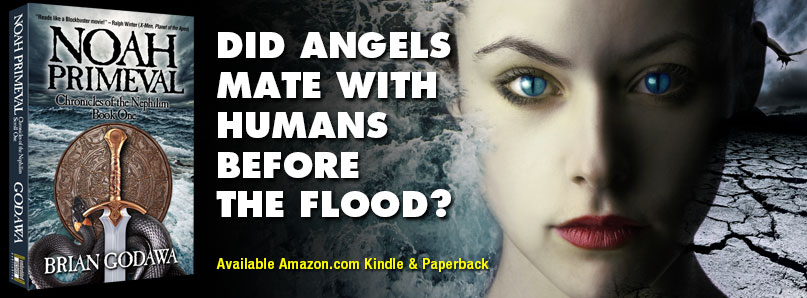
FADE OUT
All in all, the script for Noah is an uninteresting and unbiblical waste of a hundred and fifty million dollars that will ruin for decades the possibility of making a really great and entertaining movie of this Bible hero beloved by billions of religious believers, Jewish, Christian, and Muslim. This movie will be rejected by millions of devoted Bible readers worldwide because once again it subverts their own sacred narrative with a political agenda of pagan earth religion that is offensive to their Faith. In a very real sense it engages in the very sin of the primeval history in Genesis: A denial of the image of God in man.
If Noah is released, and as I am predicting, does horrible numbers at the box office after being rejected by traditionalist Christians and Jews (in spite of the studio undoubtedly hiring faith-based marketing companies to spin it as “faithful”) as well as mainstream viewers who will instead choose whatever feel-good movie is in theaters that week, studio executives will gather in their suites on Monday morning and cluck about the elusive faith-based audience and how they never turn out for “their movies,” when it was in fact a movie made by someone outside of their community that was insulting, degrading and contrary to their deeply held beliefs and values.
Brian Godawa is the screenwriter for the award-winning feature film, To End All Wars, starring Kiefer Sutherland, and Alleged, starring Brian Dennehy and Fred Thompson and the author of Hollywood Worldviews: Watching Films with Wisdom and Discernment. His most recent book is Word Pictures: Knowing God Through Story and Imagination. His new novel series, the Chronicles of the Nephilim is an imaginative retelling of the primeval history of Genesis, the secret plan of the fallen Watchers, and the War of the Seed of the Serpent with the Seed of Eve: www.ChroniclesoftheNephilim.com
The first book in the series is about Noah and the Ark, Noah Primeval available at Amazon.com.
 With all the talk surrounding the upcoming movie Noah, I thought I would add some positive elements to the conversation with some factoids and research about the Biblical Noah so you can be prepared to watch the movie with wisdom and discernment.
With all the talk surrounding the upcoming movie Noah, I thought I would add some positive elements to the conversation with some factoids and research about the Biblical Noah so you can be prepared to watch the movie with wisdom and discernment.





